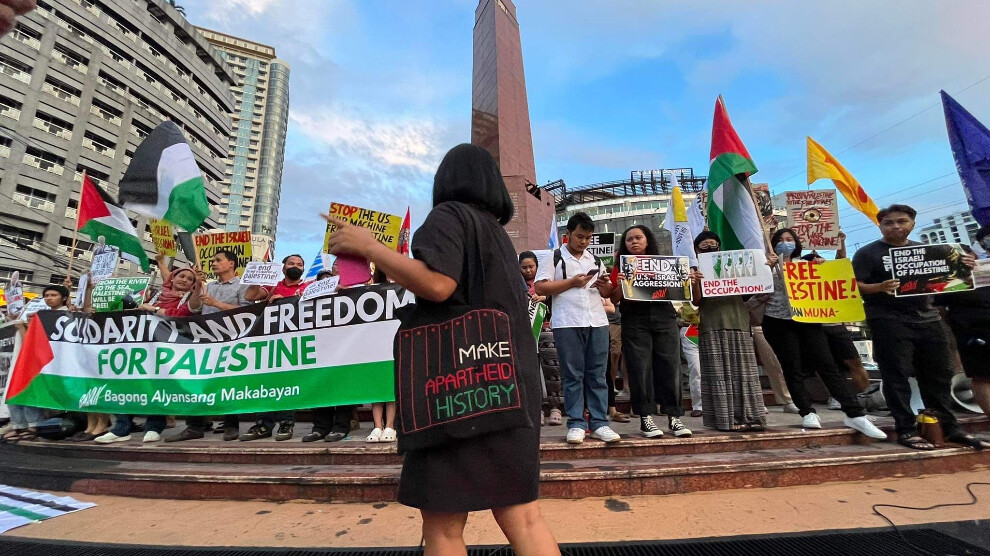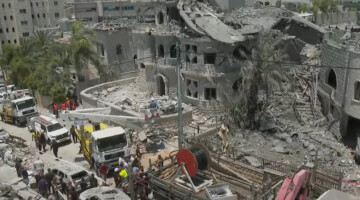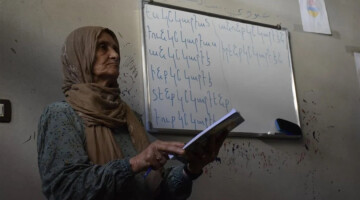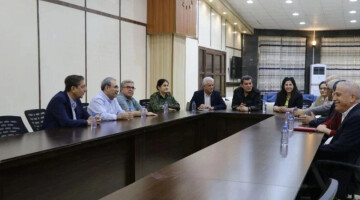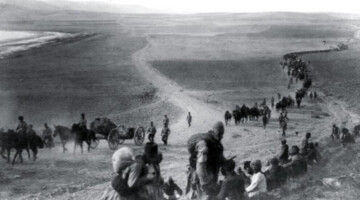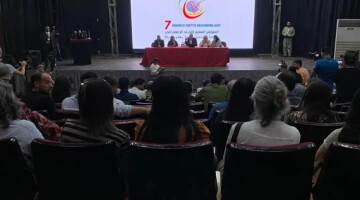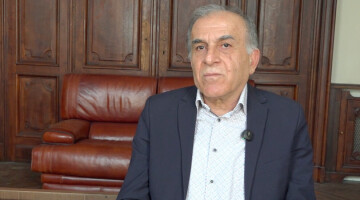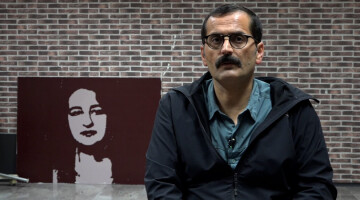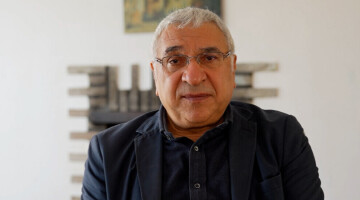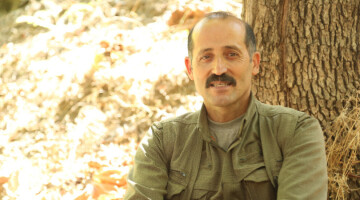An interview with Sarah Raymundo from the organisation BAYAN in the Philippines about the political situation on the ground and the prospects for resistance.
Could you present yourself and your organization?
My name is Sarah Raymundo. I am an Assistant Professor at the Center for International Studies of the University of the Philippines-Diliman. I am also a National Executive Committee Member of Bagong Alyansang Makabayan (BAYAN / New Patriotic Alliance).
Bayan is a multisectoral formation fighting bureaucrat capitalism, feudalism, and imperialism for national and social emancipation. It envisions and works for a peaceful, prosperous and just Philippine society free from imperialist rule. BAYAN was founded in May 1985, at the height of the uprising against the US-Marcos government. It gathered many mass organizations on a national scale with more than a million members, representing various social strata and spheres of society, all dedicated to the people's fight for democracy and national liberation. Founded on the tenacity and power of the majority of the oppressed classes, BAYAN’s backbone is the peasant-worker alliance. Many of our organization's members come from a variety of groups, including the youth, women, indigenous peoples, migrant workers, church people, government workers, and professionals like scientists and teachers.
Over the past decades, the Filipino people have been ruled by authoritarian governments. Former president Duterte was infamous for his brutal “war on drugs” targeting the poor, while the current president is the son of dictator Marcos. How would you characterize the Filipino state and government with a broader historical outlook?
Duterte’s brutal drug war targeted the urban poor population and killed with no due process at least 27,000 suspects from 2016 to 2022. Contrary to publicity, the drug war has not stopped under the Marcos Jr. regime. It should be traced to the Philippine puppet state’s two permanent policies: a war policy on the poor and an anti-development policy.
On account of profit accumulation on a world scale and oppression of Filipino labor, Philippine society remains semi-feudal notwithstanding an increase in service and informal workers or the unparalleled rise of the semi-proletariat compared against other sectors from the 80s to the present. The post-war period witnessed the continued control of US-led western imperialism through the subordination of former colonies to unequal trade treatises, “foreign aid” and a “structural adjustment” through the IMF-WB. Simply put, the IMF-WB made sure that the Philippines will remain a new-colony by being open to imperialist plunder. What this looks like in the concrete is the systematic reproduction of the peasant class as landless farmers who work seasonally for foreign agribusiness ventures for slave wages. They do this for more or less four months in a year. The remaining months are called "tiempo muerto” or dead season among the sugarcane and agribusiness farmers, who then must find ways to feed their families as non-wage farmers. This is the condition of landless peasants in the country. In other words, the class of landless peasants has been the reserve labor and actual farm workers for foreign agribusiness ventures located on ancestral domain and/or farmlands historically tilled by poor peasants.
The displaced segment of landless farmers populate the city and work as contractual workers in local factories and multinational export processing zones, making up at least 15% of the entire Philippine population. A rigid policy of contractualization makes for precarious work and de-unionized workplace. Others who cannot find a job do so in the informal economy. Historically, and this is a continuing past, those who leave the countryside become workers earning slave wages in urban centers. Those who perform service work for the nation’s GDP—the displaced OFWs and BPO workers—are the new industrial slaves dubbed as heroes by the government for keeping the Philippine economy afloat. Meanwhile, the poorest victims of the history of landlessness in the Philippines who did not make it abroad, or in factories, or call centers, find ways to survive in urban poor communities until they are killed in the ongoing drug war or what Neferti Tadiar powerfully analyzes as "powers of expending life" vested upon the Philippine state. This shows the Philippine state’s rigid dedication to the transfer of value to the global North. Too rigid that it can only exact death on what it deems as surplus population or Tadiar’s “expendable lives”— those who fail to contribute significantly to the extraction of surplus value for the imperialist core. Duterte’s war on drugs, which persists despite the so-called transition to the Marcos Jr. regime, reveals how the 70s neoliberal solution to the crisis of capitalism was crafted not mainly as a strategy for production. The real economy, where the production of goods takes place, was at the time already in severe crisis. One must grasp the fact that neoliberalism was conceived as a strategy for the transfer of wealth to the ruling economic elite—the one percent— at a time when profits from production are in severe decline. In such a context, production can only take place alongside a policy of war against the people whose suppression and death are necessary for continued profit accumulation on a world scale.
I had written an article on the rehabilitation of the Marcos political dynasty to the highest position of power with Ferdinand Marcos Jr. being proclaimed president of the Republic on May 25, 2022. In the article I focus on the role of US imperialism in the production of the Philippine oligarchy, which has historically served US imperialist interests, carried out its Counterinsurgency repression and ensured the transfer of wealth from the periphery to the imperialist center.
The 2022 Marcos Jr. electoral victory speaks of the rottenness of a political system dominated by oligarchs and the ascendancy of U.S. Counterinsurgency in Philippine politics. During the dark years of the Marcos dictatorship (1965-1986), people lived and many died defending rights without the rights enshrined in the 1987 Constitution to protect them. The prospect of living a better life under a Marcos Jr. presidency is dim. But the history of oligarchic politics and counterinsurgency in this country is a legacy of colonialism and a modality of imperialism that was fought and defeated, albeit incompletely, by past and present struggles for national liberation and social justice in different parts of the Global South. Now, more than ever, getting organized and a tighter grip on the anti-imperialist and anti-fascist struggle is the strongest defense we need; and it is all we have after losing to the son of a dictator.
How would you describe the position of the Philippines in the capitalist world order?
The Philippines is in the periphery of the global capitalist-imperialist order. As such, it has, since the establishment of formal government and trade sponsored by US imperialism, been a source of cheap labor, raw materials, exploitable nature, an open market for the surplus products of countries in the imperialist core and a military basing site for U.S. imperialist global militarism. The drain of value from the Philippines to the imperialist core necessitates a form of government that is subservient to the US imperialist state in order to maintain such an unequal partnership. The US as a counterinsurgency state therefore applies its very own fascist measures to the Filipino people through the Philippine State’s embrace of US Counterinsurgency, which the government inflicts upon peasants, workers, Indigenous Peoples, development workers, activists, lawyers, journalists, students — practically all citizens who are critical of state violence, government corruption and imperialist plunder.
In the concrete example of the Philippines, how do you analyse the links between the state, capitalism and patriarchy ?
In the Philippines, the drain of value from the periphery to the imperialist core takes place almost seamlessly and in the most normalized way through one of its modalities of labour enabled by an anti-development state - the Philippine government’s labour export policy and its attendant feminization of migrant labour.
The state, as the broker between global capital and Filipino labor, has policies in place for warm body export, particularly of Filipina labour. As a nation in the periphery of the global capitalist and imperialist order, the Philippines reproduces skilled Filipina labourers whom we train in the ways of patriarchy using local resources - from parental care and socialization, education and training to the moment of exportation. The feminization of migrant labour can only be possible with the state’s deployment of sexist values like feminine sacrifice, subservience and gendered martyrdom through various institutions like the family, church, mass media, the economy and education.
The export of labour has been the Philippine state’s stopgap solution and cornerstone policy up to the present. Overseas Filipino Workers (OFWs) are the top dollar earner and GDP booster. A 2018 World Bank Report reveals that in 2017 alone, the Philippines raked in Php 1.72 trillion ($32.6 billion) from OFW remittances (2018). The Aquino Administration (1986-1992) was the first to capitalize on — and officially recognize — the importance to the Philippine economy of OFWs’ remittances by calling them “new heroes.” This slogan produces a noneconomic value that seeks to elicit popular consent for and embrace for labour migration itself, erasing crucial points on the phenomenon: 1) that it is really forced migration; 2) that migrant labourers, especially women, are not protected from sexual and other forms of physical abuse and economic oppression.
Labour migration is often represented as a function of choice on account of the OFW’s willful decision to leave the country and find greener pastures abroad. The “new hero” label valorizes migrant work and displaces structural necessity with a discourse of agency that incorrectly traces itself to the Marxist concept of labour-power, which the worker “freely” sells. It further affirms the neoliberal idea of a global village in which bodies are free to circulate and grab every opportunity to reproduce themselves. Yet there is no other labour that concretely proves a worker’s enslavement to capital than labour migration. Describing the conditions of the respective economies of Hong Kong and the Philippines, migrant filipina labour scholar Nicole Constable relates that the history of the phenomenal increase in the population of Filipina domestic workers all over the world can be traced to the labour export policy initiated by Marcos in the 1970s. The 1960s and 1970s, on the other hand, were marked by the immense growth of Hong Kong’s manufacturing economy. This prompted Chinese women who previously were domestic workers to leave their employers and join the labour force. This created a demand for domestic labour, to which the Philippines responded enthusiastically, creating recruitment agencies and their counterpart placement agencies in Hong Kong.
This particular account of labour migration shows how the devalued work of Filipino women at home attains an exchange-value upon its insertion into the circuit of global capital. It further demonstrates that the exchange value of Filipina domestic workers is not conditioned by the freedom to sell labour power. Rather, exchange value is determined by the unequal development among nations, which at this juncture conditions the logic of the feminization of migrant labour under imperialist globalization. Viewed from this perspective, Filipina domestic workers are not actually free to sell their own labour-power, but are instead themselves sold as bearers of that labour-power, and that makes them as theorist Neferti Tadiar avers, “new industrial slaves.”
What role do anti-patriarchal and feminist struggles play for social change in the Philippines? What are their topics and forms of organization ?
Women’s organization in the Philippines under the banner of national democracy take the lead in articulating the situation of rural and urban poor dwellers and in fighting for their rights and gaining access to affordable housing, jobs, health services, etc. As part of the national democratic movement for social justice, women’s organizations situate gender and class issues within a concrete historical context (i.e., the Philippine semi-feudal mode of production as the social basis of monopoly finance capitalism). It is necessary to understand the specificity of women’s experience in a Third World society. For example, GABRIELA, an alliance of women’s grassroots organizations highlights the plight of rural women and their families who suffer from a heightened militarization program in the countryside. On account of women’s role in keeping the family intact, state violence of this kind has had a heavier impact on wives and mothers who lose their husbands or children along with their homes.
In the same vein, urban poor women agonize when their homes are violently demolished by city authorities. Women in both rural and urban areas do not only oversee household budget and childcare. They are also forced to earn a living mostly as contractualized workers in Export Processing Zones (EPZs) or as part of the informal economy or the growing semi-proletariat who are engaged in washing clothes, giving manicures, peddling, care-giving, dressmaking, mat-weaving.
These conditions necessitate the continued mobilization and organization of peasant and working-class women who are in the best position to study, synthesize and articulate the impacts of interlocking oppressions (gender, class, national) as they organize communities in various sectors; and raise this crucial form of consciousness, politics and organization to the level of the broad anti-imperialist and anti-fascist national struggle towards socialism.
What is your perspective on Jineolojî and how can it feed the women's movements in your country?
There are striking convergences between Jineolojî and the women’s movement in the Philippines. First and foremost is the importance both these struggles place in the history of the women’s struggle that is firmly anchored on the people’s struggle. From this recognition follows an anti-colonial, anti-imperialist politics that also challenges patriarchal and androcentric knowledge structures and institutions as well as the false and non-inclusive solutions offered by western liberal feminism.
The women’s movement in the Philippines is deeply rooted in the revolutionary struggle of women against colonialism and imperialism. From the organs of armed revolutionary political power in the Philippine countryside to workers' picket lines, street protests in the city and other sites where the special oppression of women is raised as an urgent issue to be solved within the vision of national liberation and socialism, an indispensable science of women’s liberation can be synthesized and made available for all people’s movements in the world. The Kurdish women’s movement has a stated and clear claim on forging a field of science of women’s revolutionary struggle by re-examining women’s histories, asserting women’s importance in society and prove the same to be of primary importance towards developing and building international organizations not only in the Middle East but in the global South. This transnational approach to feminist decoloniality based on actual peoples’ struggle with the amplified voices of marginalized yet fighting women is, as envisioned by jineolojî, a new paradigm that goes beyond what we know of feminism and its mainstream variants. Indeed, we also need to be reflexive and turn our revolutionary practice into proletarian concepts that will enrich our organized political battles for gender-based equality and overall social justice.
More generally, how do you assess the current situation of democratic forces, your own organisation but also other movements and groups ?
Broadly speaking, the democratic forces in the Philippines work in parallel struggles. We have the urban mass movement composed of patriotic and democratic forces across sectors led by the peasant-worker alliance. These mass organizations with the example of GABRIELA, Kilusang Mayo Uno (May One Movement), Kilusang Magbubukid ng Pilipinas (Peasant Movement of the Philippines), League of Filipino Students (LFS) Alliance of Concerned Teachers (ACT) and other organizations within the network of BAYAN played a pivotal role in arousing, mobilizing and organizing the broad people’s movement that ousted U.S.-backed dictator Marcos in 1986 after twenty years in power. This is the backbone of the broad movement that pushed the Philippine Senate to vote against the renewal of the U.S. military bases in September 1991. The national democratic movement’s crucial participation in building one of the largest global anti-imperialist movements from the late 90s to present — the International League of Peoples’ Struggle (ILPS)— have proven to be fruitful and beneficial to its current effort at building the global anti-fascist and anti-imperialist united front with our comrades from the Kurdish movement.
The Philippines holds the record of the longest-running armed revolution in Asia and in the world, led by the Communist Party of the Philippines. This party has produced and developed a United Front (National Democratic Front of the Philippines) of underground organizations representing various sectors —workers, farmers, students, women, Indigenous Peoples, Moro People, artists, teachers, church people, etc. — that is engaged in broadening and deepening the involvement and commitment of patriotic and democratic forces in revolutionary struggle. The CPP also leads a revolutionary army. the New People’s Army (NPA). The NPA is engaged in building organs of political power in the countryside composed mainly of poor landless peasants joined by revolutionized and proletarianized democrats and patriots from different classes across sectors. These organs of political power in the countryside are responsible for the agrarian revolution, mass base building and armed revolution.
Whether one is an unarmed activist in one of the urban mass organizations or a revolutionary armed cadre with different methods and styles of work and varying degrees of sacrifice, the vision for genuine agrarian reform and national industrialization is a common ground as well as the demand for the Philippine pro-imperialist state to address the roots of the armed conflict and work for a genuine and lasting peace. The relentless fascist and imperialist attacks on organized movements worldwide require a closer study and reaffirmation of the principles that allowed for progressive movements to build a broad united front against fascism and imperialism in historical moments when the same assaults on our people were severe and had already reached a level of pure destruction. We are facing the same, if not worse, conditions now. Yet building stronger workers and peasant organizations is a challenging task under conditions of contractualized labor, semi-proletarianization of labor, land grabs, zero national industrialization plan, militarization in the countryside. The continued commercialization and commodification of education aggrandize and reward individualist and careerist modes of approaching knowledge production. In this context, organizing for academic freedom and the freedom of association is seen as burdensome or even useless rather than an opportunity for self-improvement and joyful association with fellow human beings. Mainstream art and culture and the practices therein militate against the project of social liberation, which requires commitment to a disciplined, creative and scientific study of society toward revolutionary change as opposed to a highly distracted, time-deficient attention given to the same goals for advancement. Observable tendencies toward sectarianism and cooptation, particularly, the reluctance of otherwise progressive groups to unite with peoples’ and revolutionary organizations on the basis of building the global broad united front against US-led western imperialism is a political and organizational obstacle that may be easier to overcome with enhanced international solidarity work in all its various forms.
Why is international organizing important to you, and what is your perspective on the Kurdistan Liberation Movement in this process ?
It is important to reach out to peoples of other nations because colonial and imperialist wars are not exclusive attacks on the Filipino people. While the first victorious armed anti-colonial struggle in Asia against Spain was waged by Filipinos who were part of the Katipunan Revolution, the subsequent occupation and continued control of U.S. imperialism over the Philippines behooves us to connect with and learn from the experiences of our comrades from different parts of the world. The national democratic movement toward socialism, which was also founded during the height of the Cold War and the rise of Third World revolutionary struggles, deals with the particular characteristics of our country and struggle.
The Kurdish question, as elucidated by Abdullah Öcalan, correctly asserts that specific characteristics are not mere questions of nationhood and ethnicity but also of democracy and liberation. For inspiring his people by outlining and working towards a revolutionary horizon, Öcalan’ has suffered imprisonment and solitary confinement. This is a grave injustice done to peoples worldwide who, despite being warned about the end of the world due to planetary climate catastrophe caused by imperialist production, would still seek to end exploitation and oppression against all odds.
It is therefore beneficial for us to learn from the Kurdish movement and the ways in which thoroughgoing grassroots organizing may significantly enrich our understanding of the national question toward national liberation. This is a solution that will truly democratize the national aspect of our struggle without re-creating conditions for dependency and repressive capitalist monopolies.
The Philippines holds the record of being one of the most culturally diverse countries in the world and a home to a large diversity of ethnic groups with 172 languages. The relationship of many of these ethno-linguistic groups to mainstream society has been one of the main issues of governance, especially since the United States occupied the Philippines in 1898. The relationship between marginalized ethno-linguistic groups and the local ruling elite has been largely shaped by the imposition of modernization and forced incorporation into the world economy. A vision of a truly democratic governance by and for the people in the context of ethnic diversity is an important horizon of analysis and social practice. It is one in which we could exchange experiences and lessons on democratic practices and plans toward the path of self-determination and other related goals with the Kurdish movement.
What is your source of strength and hope to keep struggling in the future?
Among so many outlined sources of strength and hope, it is the living memory of fallen comrades in combat that keep me grounded on the peoples’ struggle. Their names will not remain anonymous as we continue to write and live the revolutionary history of our people who struggle for a better world.
Source: Academy of Democratic Modernity

